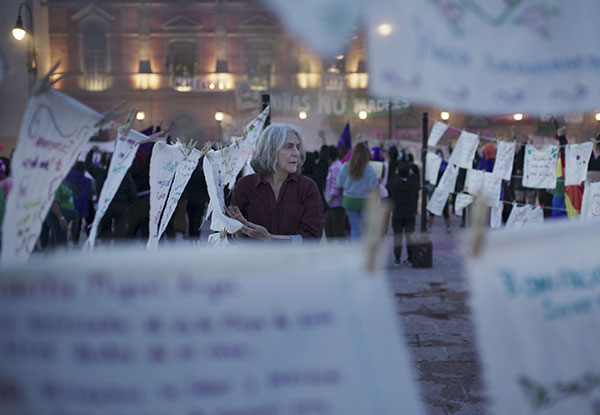Noise (Ruido) looks at crime and violence from the perspective of its victims’ loved ones, before urging everyone to speak against the corruption that lets it happen.
Noise (Ruido) is a Spanish-language Netflix film directed and co-written by Natalia Beristáin. Julieta Egurrola stars as Julia, a mother whose daughter disappeared many months ago. All attempts to comfort her have failed, and the police have proven to be of no real help to her. In her continued search, Julia comes across more mothers, sisters, daughters, and other women who have gone through similar losses, exposing her to the deeply rooted corruption, violence, and trauma that has torn apart so many lives in Mexico. In the process, maybe she’ll find a way to speak out and stop the ceaseless noise that’s haunted her own head for so long.
I am not the person to go to when it comes to understanding Mexican politics or history. I’m not going to pretend I have that much knowledge on what’s been going on in that country or how accurately it’s represented here. With that said, if you’re like me and are perhaps turning to Noise as a possible way to remedy that lack of knowledge, you probably won’t come out of it with too much more insight outside of how widespread the issues are. Noise doesn’t go too deeply into the nuances or core problems fueling the crises and violence we see. It really clings to the viewpoint of an observer who’s going through such a crisis herself, and even her conversations with other women or officials are more centered around emotion than history or explanation.
But as far as that emotion goes, you definitely feel it. Egurrola’s performance is very quietly effective. You’d expect her to understandably play the role with the loud, rageful intensity that almost anyone would feel in her situation. But Julia always holds herself together even though she looks and sounds like she’s about to completely break down or scream. It’s a much more fatigued kind of anger, laced more with sadness and helplessness. Her pain also comes not as much from the idea of losing her daughter as the lack of closure and having no idea if she’s truly lost her for good. That’s the noise that won’t leave her head, and you see her bitterness rising slowly throughout the film as she witnesses many more people who are suffering through that same noise.

A majority of Noise is spent simply following Julia around to different places for the sake of investigations, searches, or just sharing stories with other women. You’re taken from location to location to see the aftermaths of horrific acts of violence of varying scales, and you don’t really learn that much new with each visit. I was going to criticize the film for that repetitive structure and surface-level portrayal of tragedy, but then I realized: that reflects what these people are going through. All of the tragedy is so frequent and so widespread that it’s become similarly repetitive without anything being moved forward. The frustration a viewer may feel when being shown essentially the same thing again must pale in comparison to the torture it is for the characters to go through that and know that their whole country is bleeding as well. You also see such torture pile onto Julia’s psyche. She’s not alone in her pain, but that also means she’s just another of many victimized people.
Once an unjust act happens to someone else close to her, right in front of her, you can see all of that experience reach its boiling point. And in the finale to Noise, the film itself finally lets its pent-up anger out. A protest is brought together to make a grand stand, and it’s as well-acted as it is uncomfortably shot and staged. A lot of relatively long takes make you feel like you’re there in the midst of the resulting chaos, and you see the widespread corruption of the country’s government and enforcement firsthand when things turn ugly. But what also makes the sequence so effective is how much of the horrors of the country we’ve been seeing from the start, putting us in the women’s points of view and letting us be sick of it all. This includes Julia herself, who starts to break out of her shell after going through the whole film looking nervous to speak so loudly and be a part of something so big.
I still wish there was a little more insight into why all of these tragedies keep happening, rather than the more general, vague details we get. I again completely understand why the perspective was kept more to the observers, but I wonder if a bit more of a balance between those two ends could have worked without sacrificing either. Really, though, what matters most is that Noise gets its point across in an overall engaging and resonant way. Even with my very limited knowledge on the subject matter, I have no doubt these issues are real and deserve to be looked into and fought against, so to bring more people’s attention to them like this can only be a good thing. Even when the film is frustrating or numbing to watch, I really feel like that’s the intention, and when it reached the end, I understood why it needed to be that way. Clearly, there are other points of view that matter far more than mine when it comes to these topics. But if you have any interest in Noise, I can at least nudge you a little further into seeing it for yourself.
Noise (Ruido) is now streaming globally on Netflix.

